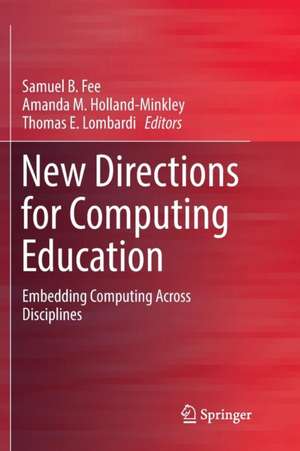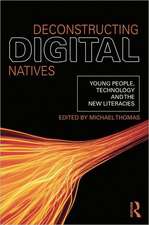New Directions for Computing Education: Embedding Computing Across Disciplines
Editat de Samuel B. Fee, Amanda M. Holland-Minkley, Thomas E. Lombardien Limba Engleză Paperback – 25 iul 2018
The book discusses new approaches to computing education, and considers whether the modern ubiquity of computing requires an educational approach that is inherently interdisciplinary and distinct from the traditional computer science perspective. The alternative approach that the authors advocate derives its mission from an intent to embed itself within an interdisciplinary arts and science context.
An interdisciplinary approach to computing is compellingly valuable for students and educational institutions alike. Its goal is to support the educational and intellectual needs of students with interests in the entire range of academic disciplines. It capitalizes on students’focus on career development and employers’ demand for technical, while also engaging a diverse student body that may not possess a pre-existing interest in computing for computing’s sake. This approach makes directly evident the applicability of computer science topics to real-world interdisciplinary problems beyond computing and recognizes that technical and computational abilities are essential within every discipline.
The book offers a valuable resource for computer science and computing education instructors who are presently re-thinking their curricula and pedagogical approaches and are actively trying new methods in the classroom. It will also benefit graduate students considering a future of teaching in the field, as well as administrators (in both higher education and high schools) interested in becoming conversant in the discourse surrounding the future of computing education.
| Toate formatele și edițiile | Preț | Express |
|---|---|---|
| Paperback (1) | 389.70 lei 6-8 săpt. | |
| Springer International Publishing – 25 iul 2018 | 389.70 lei 6-8 săpt. | |
| Hardback (1) | 397.01 lei 6-8 săpt. | |
| Springer International Publishing – 25 apr 2017 | 397.01 lei 6-8 săpt. |
Preț: 389.70 lei
Nou
Puncte Express: 585
Preț estimativ în valută:
74.58€ • 80.98$ • 62.65£
74.58€ • 80.98$ • 62.65£
Carte tipărită la comandă
Livrare economică 22 aprilie-06 mai
Preluare comenzi: 021 569.72.76
Specificații
ISBN-13: 9783319853468
ISBN-10: 3319853465
Ilustrații: XI, 308 p. 11 illus.
Dimensiuni: 155 x 235 mm
Greutate: 0.45 kg
Ediția:Softcover reprint of the original 1st ed. 2017
Editura: Springer International Publishing
Colecția Springer
Locul publicării:Cham, Switzerland
ISBN-10: 3319853465
Ilustrații: XI, 308 p. 11 illus.
Dimensiuni: 155 x 235 mm
Greutate: 0.45 kg
Ediția:Softcover reprint of the original 1st ed. 2017
Editura: Springer International Publishing
Colecția Springer
Locul publicării:Cham, Switzerland
Cuprins
Introduction. Re-envisioning Computing Across Disciplines (Samuel B. Fee, Amanda M. Holland-Minkley and Thomas E. Lombardi).- Part I. The Case for Interdisciplinary Computing Education.-Chapter 1. Good (and Bad) Reasons to Teach All Students Computer Science (Colleen M. Lewis).- Chapter 2. Approaching Computer Science Education Through Making (Michael Eisenberg).- Chapter 3. Computer Science and the Liberal Arts: Hidden Synergies and Boundless Opportunities (Gary R. Skuse, Daniel A. Walzer, Kathryn Tomasek, Douglas Baldwin and Mark Bailey).- Chapter 4. Task-driven Programming Pedagogy in the Digital Humanities (David J. Birnbaum and Alison Langmead). Chapter 5. Macroanalysis in the Arts and Sciences (Thomas E. Lombardi).- Part II. Pedagogical & Curricular Approaches.- Chapter 6. An Unnamed Intersection: Where Computing Meets Liberal Arts (Enid Arbelo Bryant).- Chapter 7. Adapting the Studio Based Learning Methodology to Computer Science Education (Paula Alexandra Silva, Blanca J. Polo, and Martha E. Crosby).- Chapter 8. The Curricular Soundtrack: Designing Interdisciplinary Music Technology Degrees Through Cognitive Apprenticeship and Situated Learning (Daniel A. Walzer).- Chapter 9. An Interdisciplinary Model for Liberal Arts Computing Curricula (Amanda M. Holland-Minkley and Samuel B. Fee).- Part III. Case Studies and Examples.- Chapter 10. The Development of a B.A. in Computer Science and Computational Thinking (Kathie A. Yerion, Robert L. Bryant, and Shawn Bowers).- Chapter 11. Disciplinary Thinking, Computational Doing: Collaborating for Mutual Enrichment (Valerie Barr).- Chapter 12. A Capstone Experience in Information Technology (William H. Thomas, Loren K. Rhodes, and Gerald W. Kruse).- Chapter 13. Trial by a Many-Colored Flame: A Multi-Disciplinary, Community-Centric Approach to Digital Media and Computing Education (Adrienne Decker, Andrew Phelps, and Christopher A. Egert).- Chapter 14. A GitHub Garage for a Digital Humanities Course (Elisa E. Beshero-Bondar and Rebecca J. Parker).- Chapter 15. Educators as Clinicians: Small Data for Education Research (Thomas E. Lombardi and Amanda M. Holland-Minkley).- Chapter 16. Common Threads: Directions for Computing Education (Samuel B. Fee, Amanda M. Holland-Minkley and Thomas E. Lombardi).- About the Editors.- About the Authors.- Index.-
Notă biografică
Samuel B. Fee is a Professor and Chair of Computing & Information Studies at Washington & Jefferson College. His research interests extend into the realms of computing, education, and digital media production. His inquiries within these areas are aimed at better answering a few specific questions, including: How can we best learn and conduct research within the broader realm of computing? How does technology change the way we interact with one another? How do visuals and interfaces impact our abilities to communicate and learn? And, beyond the quantitative methodologies of current Social Science research, how do we reinvigorate the discourse concerning the Art of teaching? He previously co-edited the volume The Role of Criticism in Understanding Problem Solving. He publishes regularly on the topics of computing pedagogies and educational research as well as software development and digital media.
Amanda M. Holland-Minkley is an Associate Professor of Computing & Information Studies at Washington & Jefferson College. Her research explores novel applications of problem-based and hands-on pedagogies to computer science education, both at the course and the curricular level. These applications strive to transform computer science content into forms useful and accessible to students from a diversity of disciplines. She is also highly engaged in undergraduate research, with recent projects falling at the intersection of information security, data management, and machine learning.
Thomas E. Lombardi is an Assistant Professor of Computer Information Systems in the School of Business at the University of the Virgin Islands. His research focuses on the application of data science and interdisciplinary computing to a wide range of subjects such as digital humanities, networking and bioinformatics. He is particularly interested in developing pedagogies for teaching data-oriented concepts to a broad audience for the purpose of improving civic education. Most recently his theoretical research has addressed the potential role of computation in the analysis of iconography. Specifically, this project applies data mining and machine learning techniques to large repositories of artwork.
Amanda M. Holland-Minkley is an Associate Professor of Computing & Information Studies at Washington & Jefferson College. Her research explores novel applications of problem-based and hands-on pedagogies to computer science education, both at the course and the curricular level. These applications strive to transform computer science content into forms useful and accessible to students from a diversity of disciplines. She is also highly engaged in undergraduate research, with recent projects falling at the intersection of information security, data management, and machine learning.
Thomas E. Lombardi is an Assistant Professor of Computer Information Systems in the School of Business at the University of the Virgin Islands. His research focuses on the application of data science and interdisciplinary computing to a wide range of subjects such as digital humanities, networking and bioinformatics. He is particularly interested in developing pedagogies for teaching data-oriented concepts to a broad audience for the purpose of improving civic education. Most recently his theoretical research has addressed the potential role of computation in the analysis of iconography. Specifically, this project applies data mining and machine learning techniques to large repositories of artwork.
Textul de pe ultima copertă
Why should every student take a computing course? What should be the content of these courses? How should they be taught, and by whom? This book addresses these questions by identifying the broader reaches of computing education, problem-solving and critical thinking as a general approach to learning.
The book discusses new approaches to computing education, and considers whether the modern ubiquity of computing requires an educational approach that is inherently interdisciplinary and distinct from the traditional computer science perspective. The alternative approach that the authors advocate derives its mission from an intent to embed itself within an interdisciplinary arts and science context.
An interdisciplinary approach to computing is compellingly valuable for students and educational institutions alike. Its goal is to support the educational and intellectual needs of students with interests in the entire range of academic disciplines. It capitalizes on students’focus on career development and employers’ demand for technical, while also engaging a diverse student body that may not possess a pre-existing interest in computing for computing’s sake. This approach makes directly evident the applicability of computer science topics to real-world interdisciplinary problems beyond computing and recognizes that technical and computational abilities are essential within every discipline.
The book offers a valuable resource for computer science and computing education instructors who are presently re-thinking their curricula and pedagogical approaches and are actively trying new methods in the classroom. It will also benefit graduate students considering a future of teaching in the field, as well as administrators (in both higher education and high schools) interested in becoming conversant in the discourse surrounding the future of computing education.
The book discusses new approaches to computing education, and considers whether the modern ubiquity of computing requires an educational approach that is inherently interdisciplinary and distinct from the traditional computer science perspective. The alternative approach that the authors advocate derives its mission from an intent to embed itself within an interdisciplinary arts and science context.
An interdisciplinary approach to computing is compellingly valuable for students and educational institutions alike. Its goal is to support the educational and intellectual needs of students with interests in the entire range of academic disciplines. It capitalizes on students’focus on career development and employers’ demand for technical, while also engaging a diverse student body that may not possess a pre-existing interest in computing for computing’s sake. This approach makes directly evident the applicability of computer science topics to real-world interdisciplinary problems beyond computing and recognizes that technical and computational abilities are essential within every discipline.
The book offers a valuable resource for computer science and computing education instructors who are presently re-thinking their curricula and pedagogical approaches and are actively trying new methods in the classroom. It will also benefit graduate students considering a future of teaching in the field, as well as administrators (in both higher education and high schools) interested in becoming conversant in the discourse surrounding the future of computing education.
Caracteristici
Offers new approaches to computing education that reflect the ubiquity of computing across science, technology and the arts Takes a broad look at how computing fits in many disciplines, including non-scientific ones Emphasizes the applicability of computer science topics to a diverse range of real-world problems Provides a modern and forward-thinking text for computer science and computing education instructors Includes supplementary material: sn.pub/extras








